Kingston SSDNow V+100 Review
by Anand Lal Shimpi on November 11, 2010 3:05 AM EST- Posted in
- Storage
- SSDs
- Kingston
- SSDNow V+100
Overall System Performance using PCMark Vantage
Next up is PCMark Vantage, another system-wide performance suite. For those of you who aren’t familiar with PCMark Vantage, it ends up being the most real-world-like hard drive test I can come up with. It runs things like application launches, file searches, web browsing, contacts searching, video playback, photo editing and other completely mundane but real-world tasks. I’ve described the benchmark in great detail before but if you’d like to read up on what it does in particular, take a look at Futuremark’s whitepaper on the benchmark; it’s not perfect, but it’s good enough to be a member of a comprehensive storage benchmark suite. Any performance impacts here would most likely be reflected in the real world.
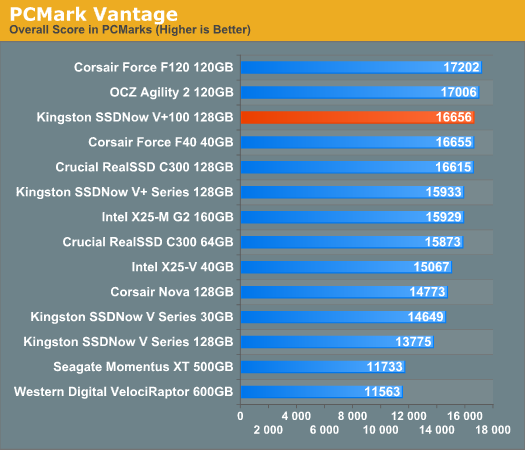
The SSDNow V+100 does very well here. Overall performance is in the top 3, higher than we’ve ever seen Kingston reach. In fact throughout the PCMark Vantage suite you'll see the SSDNow V+100 do very well. In some areas it's the fastest drive of the bunch (by a hair), while in others it's more of an average performer.
The Corsair Force F40 is the highest performing low capacity drive as you'd expect, beating out even the Intel X25-M G2. The 64GB C300 isn't too far behind however.
The memories suite includes a test involving importing pictures into Windows Photo Gallery and editing them, a fairly benign task that easily falls into the category of being very influenced by disk performance.
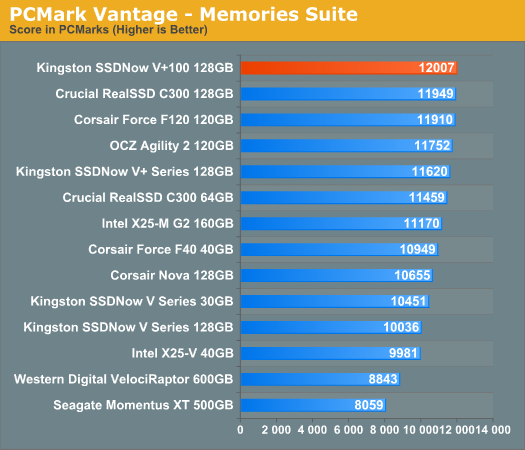
The TV and Movies tests focus on on video transcoding which is mostly CPU bound, but one of the tests involves Windows Media Center which tends to be disk bound.
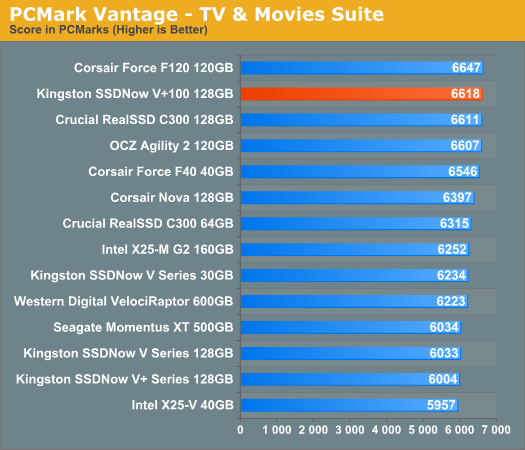
The gaming tests are very well suited to SSDs since they spend a good portion of their time focusing on reading textures and loading level data. All of the SSDs dominate here, but as you'll see later on in my gaming tests the benefits of an SSD really vary depending on the game. Take these results as a best case scenario of what can happen, not the norm.
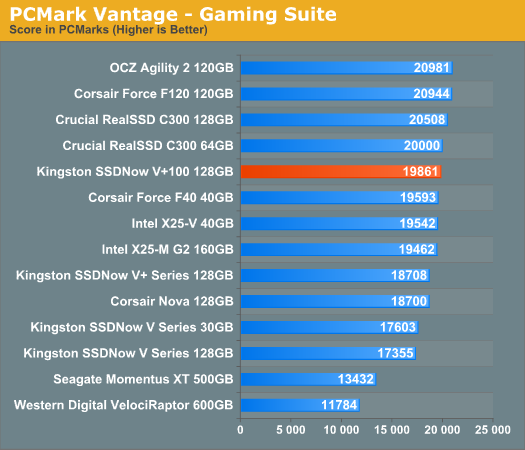
In the Music suite the main test is a multitasking scenario: the test simulates surfing the web in IE7, transcoding an audio file and adding music to Windows Media Player (the most disk intensive portion of the test).
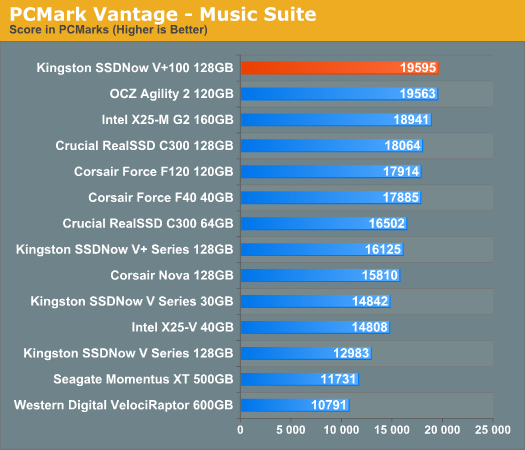
The Communications suite is made up of two tests, both involving light multitasking. The first test simulates data encryption/decryption while running message rules in Windows Mail. The second test simulates web surfing (including opening/closing tabs) in IE7, data decryption and running Windows Defender.
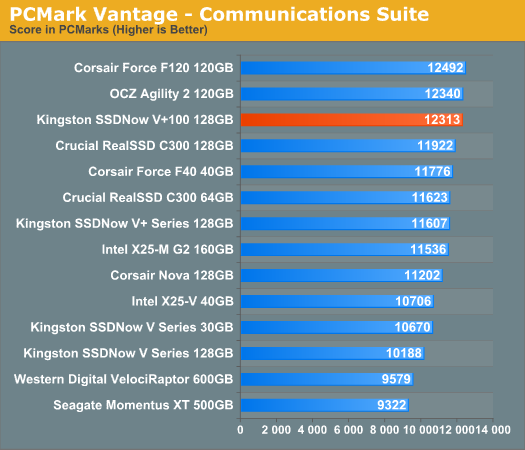
I love PCMark's Productivity test; in this test there are four tasks going on at once, searching through Windows contacts, searching through Windows Mail, browsing multiple webpages in IE7 and loading applications. This is as real world of a scenario as you get and it happens to be representative of one of the most frustrating HDD usage models - trying to do multiple things at once. There's nothing more annoying than trying to launch a simple application while you're doing other things in the background and have the load take forever.
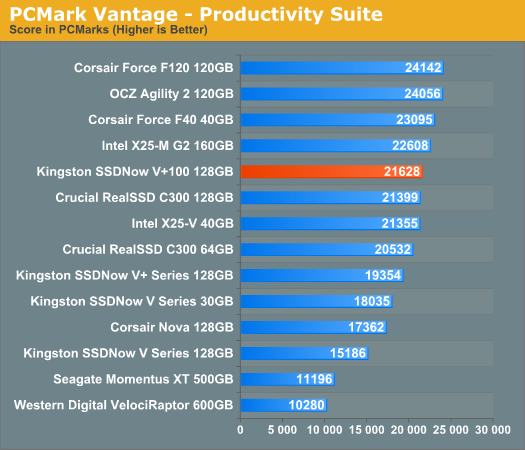
The final PCMark Vantage suite is HDD specific and this is where you'll see the biggest differences between the drives:
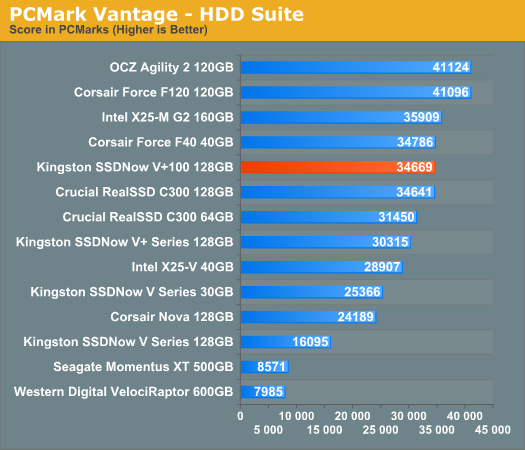
For pure I/O the SSDNow V+100 is good but not the best. Overall performance, as we've seen above looks to be pretty decent however. Let's keep going.










96 Comments
View All Comments
pvdw - Monday, November 15, 2010 - link
"check the speed without compression and then compare drives "That makes no sense!
It's like saying disable branch predictions on one processor because another doesn't have it. Or disable the turbo on one car when comparing to a competing car that is naturally aspirated.
Out of Box Experience - Monday, November 15, 2010 - link
It makes all the sense because it would be a fair comparison of all the SSD's availableNot all drives have compression and not all data is compressible so why not test them all without compression?
Are you afraid that OCZ would be at the bottom of the list in a fair test like this?
Well, you may be right!
Lets test them to be sure
.harm - Thursday, November 11, 2010 - link
I'm not an expert on SSDs and RAID. So excuse me if my question is a bit stupid.I always understood that it´s impossible to use TRIM with a RAID configuration because the RAID controllers can't ´pass' the TRIM commands. So the SSD performance would drop overtime when using RAID. Now the SSD controller has "always-on garbage collection". Does this mean the performance in a RAID configuration doesn't drop?
AnnihilatorX - Thursday, November 11, 2010 - link
I would think so, it would at least be better off than other drive with less aggressive garbage collection.sparky76 - Thursday, November 11, 2010 - link
Will controllers like this leave OS X with a performance advantage over Windows 7, precisely because OS X has no support for the TRIM command?It seems that Win7 will have some system overhead in running TRIM while any OS without TRIM support will not suffer this, as garbage collection will be left to the firmware in the drive.
DoktorSleepless - Thursday, November 11, 2010 - link
I would love to see loading and minimum frame rate tests from actual games like what was done here a while back.http://www.anandtech.com/show/2614/14
It's just really hard to visualize real world performance even from Vantage.
I would bet a game like Fallout 3 would benefit a lot in the minimum frame rate department since it's always loading new data from the hard drive.
Nickel020 - Thursday, November 11, 2010 - link
I second this. While the IOPS for Bench are a nice measure, I don't know how to actually translate that into real world performance differences. I.e. are the differences in IOPS between say the new Kingston drive and Sandforce drives actually noticeable, and if yes, how noticeable?I would like to see a review that shows how much faster a Sandforce drive is than my old Vertex 1 and X25-M G2.
Chloiber - Thursday, November 11, 2010 - link
I'd also like to see that, as I said before.Just look at this test from (german) CB as an example:
http://translate.google.com/translate?js=n&pre...
Huge differences in synthetic tests, but a normal desktop system is just too slow to actually benefit from this!
I'm also missing these kinds of tests here. I think your earlier tests were better - now you just go through synthetic tests and show us the results, this isn't the thing I expected 1 or 2 years ago from an SSD test from anandtech.com. I'd like to see more tests which actually measure performance a user really gets when doing everyday tasks.
pavlindrom - Thursday, November 11, 2010 - link
Wouldn't it be better to have a drive-based sort function run to test how responsive the drive is? I would guess it would stress all of the corners of SSD performance. Write a bunch, shuffle in small portions when flipping values. Maybe it wouldn't test sequential erase. I still think it would show great info.Sufo - Thursday, November 11, 2010 - link
Just a quick recommendation. I have one of these, and i can confirm that with windows 7 (ie TRIM) and a 6gbps bridge the performance is pretty delicious. Grab one, if you meet these requirements.